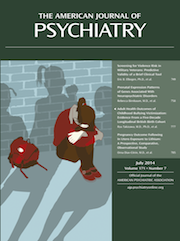The Role of Benzodiazepines in Treating Social Anxiety Disorder
To the Editor: The article by Pollack et al. (1) in the January issue of the Journal is a welcome demonstration of the benefits of using benzodiazepines in the treatment of social anxiety disorder. However, the lack of a clonazepam monotherapy arm in the study demonstrates how entrenched, in the absence of evidence, the assumption has become that benzodiazepines should not be used as first-line therapy for anxiety disorders (2). Despite evidence that benzodiazepines alone may be effective for social anxiety disorder (and other anxiety disorders) (3), misunderstanding about their potential for abuse and dependency is now a common barrier to appropriate prescription of these highly effective medications. While they are not for everyone, the systematic literature is virtually unanimous in finding that benzodiazepines have a low potential for abuse in patients who are not currently abusing other substances (4), even if the patients have a past history of substance abuse (5). In addition to potentially greater efficacy for treating anxiety disorders, benzodiazepines have the advantages of immediate onset of action, fewer side effects compared with antidepressants, and a high therapeutic index. Long-term controlled trials of benzodiazepine monotherapy, including monitoring of efficacy, tolerability, and abuse in the treatment of social and other anxiety disorders, may be difficult to fund, but would be a great service to patients who suffer from these often undertreated conditions.
1 : A double-blind randomized controlled trial of augmentation and switch strategies for refractory social anxiety disorder. Am J Psychiatry 2014; 171:44–53Link, Google Scholar
2 : A major change of prescribing pattern in absence of adequate evidence: benzodiazepines versus newer antidepressants in anxiety disorders. Psychopharmacol Bull 2008; 41:39–47Medline, Google Scholar
3 : Treatment of social phobia with clonazepam and placebo. J Clin Psychopharmacol 1993; 13:423–428Crossref, Medline, Google Scholar
4 : Current benzodiazepine issues. Psychopharmacology (Berl) 1995; 118:107–115, discussion 118, 120–121Crossref, Medline, Google Scholar
5 : Assessing the risks and benefits of benzodiazepines for anxiety disorders in patients with a history of substance abuse or dependence. Am J Addict 2001; 10:48–68Crossref, Medline, Google Scholar



